There are lots of ways to try and ruin it for everyone. Covid restrictions that make no sense are a proven successful strategy for this, demanding the Doing of More. Monkeypox offers exciting additional ruining potential.
The surprise winner, however, is an old Alzheimer’s paper that it seems the entire field of drug development and diagnosis was based around, and it turned out it’s not only fraud, it’s very obvious fraud once you actually look at the manipulated images?
The full implications of this are being insufficiently explored.
Executive Summary
Case levels are steady and should remain so.
Whole field of Alzheimer’s has been based on a fraud for decades.
Various monkeypox news got split off into another post.
Also yes, Biden got Covid, but it doesn’t even make a bullet point, he’s fine.
Let's run the numbers.
The Numbers
Predictions
Prediction from last week: 780k cases (+1%) and 2,450 deaths (+0%)
Results: 807k cases (+5%) and 2,964 deaths (+21%).
Prediction for next week: 850k cases (+5%) and 2,850 deaths (-3%).
Last week Colorado reported -158 deaths, which I didn’t notice, after 234 the previous week and now 234 again this week. Three of the previous four weeks had zero. That explains most of the prediction error and why the numbers keep flopping back and forth, as the real number should probably be more like 50. Thus I predict a moderate decline. There’s no real uncertainty here that’s worth much, the game is predicting reporting errors.
Deaths
Cases
Biden got Covid, but he’s feeling much better now, he’s tested negative twice.
Physical World Modeling
The headline: White House to Launch Effort to Develop Next Generation of Covid Vaccines. More accurate would be ‘White House to hold meeting to ask how development is going on next generation of Covid vaccines.’ The work is being done by Pfizer and Moderna. Calling them in to talk about it is not launching an effort. Giving them additional funding for it would speed things along, but the White House already knows this and Congress is continuing to not provide the funds. I do think it is a worthwhile use of time to hold the meetings.
Study finds three shots plus an Omicron infection are 94% effective against BA.5.
Should hospitals continue to screen everyone for Covid, given that most Covid cases in hospitals are there for unrelated reasons? Yes. You should check for Covid. It is context that could be important and very easy to check. The counterargument is that if you’re in a hospital the test now probably costs a thousand dollars and if you’re positive they would feel obligated to do a lot of crazy stuff so maybe it’s better not to know? Crazy begets crazy.
Bloom Labs updates its projections of potential future escape by variants. More about how it would happen then likelihood or magnitude.
Boston schools post CO2 levels of all rooms. This is valuable information, but it will be a good idea if and only if the information is used in ways that are net helpful. This is by no means something one can assume. The default outcome could be ‘sometimes we figure out to open a window or fix a problem’ but also seems like it could easily a series of panics and conflicts over nothing. We’ll see.
Knowing more about Covid correlates with being more worried about Covid (direct link, toplines).
I think Matthew is mostly correct here, and the correlation is that those inclined to be worried are more likely to follow the news. There’s still a clear plurality there for the worst being behind us, which I view as clearly correct - it might turn out to be wrong with a new strain but it is by far the most likely outcome.
As evidence, when I think about what I would do in worlds where I don’t have a blog, I likely would have stopped paying attention if and only if I thought the worst was over. If anything, the correlations seem low here, especially (and amusingly) the correlation with saying ‘I don’t know.’ Ignorance is not strength, but strong opinion reduces the value of further knowledge.
For more fun, let’s dig further into the poll. Here are the Covid questions.
A majority think they haven’t had Covid. Given that many cases are asymptomatic, there is an interesting dynamic here where any given person probably got Covid, but conditioning on their experience a majority of them think they didn’t have it, and they could even be correct about what their estimate should be, although my guess is they are in general somewhat low. Then again, I’m guessing I probably haven’ had it.
Polls always have interesting assumptions in them, like #70’s implication that the people you ‘personally know’ are either you, family members or close friends. That is kind of bizarre, as most of the people I know aren’t any of those things. There’s one me, maybe a dozen family members that count as people I know. How many people would I consider a close friend? Subjective, but maybe two dozen or so, whereas I know hundreds at least and likely thousands.
Big booster energy. The official stats say ~50% of the vaccinated are boosted (and 10% of them were originally J&J which muddies things) and this has it at 59%, reflecting the bias of people who respond to polls I suppose. Even bigger booster energy is the 28% chance to then get a fourth shot, the 25% chance to want another shot right now (what’s stopping these people?) and another 47% to want another eventually, so 72% of the vaccinated intend to get (another) booster at some point. I don’t.
The disagreement over current case counts is amusing, with a full 25% thinking case counts are going down. They really aren’t following.
Does never work for you, the 26%? It is a coherent position. It’s not like the flu is going away, and you could call that a pandemic if you wanted. There are worse things. In particular, the aging pandemic has yet to end, with fatality holding at 100%.
Paxlovid and Rebounding
This thread gathers what little data we have on Paxlovid rebounds.
Lacking proper scientific study, Twitter data was gathered. When people discussed rebounds, when did they take Paxlovid?
I like this methodology for relative risk of rebound given different Paxlovid timing, although it is useless for knowing the baseline frequency of rebounds. It does seem like waiting until day 3 substantially reduces the chance of rebounds. Longer waits than that endanger the effectiveness of the treatment. Luckily there seems to be overlap.
In Other News
Tyler Cowen calls Biden’s Covid Diagnosis a wake-up call for America (Bloomberg). The piece is strange. It affirms that ignoring the pandemic is the right private move for most people, but calls planning trips harder ‘because you do not know who is going to show up’ and that you have to worry about who you might infect. I would argue that no, you do not need to worry about that any more than you would have in the past. I do agree that our collective response, in terms of developing superior vaccines and other pharmaceutical responses, is a horrible failure, but our private action of ignoring the situation seems not only privately optimal but optimal for the public as well. I wouldn’t want regular people to ‘take one for the team’ here.
Patrick McKenzie tells the story of getting boosted. Be like Patrick in the ways you should be like Patrick, and in other ways do not be like Patrick. Mostly be like Patrick, he might be my favorite Twitter account at this point.
Should your child get vaccinated? Many say no. Ask your doctor?
What one does with one’s own children is a very strong signal, but doctors have a strong bias. Parents overall are sending a different signal and vaccinating less in each younger age group. Only 2.8% of children under 5 have their first shot so far. Which is correct (although a bit extreme) relative to other decisions, and I agree with thread that blaming this on ‘misinformation’ would only backfire. More importantly, it isn’t true. It’s about thinking differently.
Anthony Fauci says if we could do it again, Covid-19 restrictions would be ‘much, much more stringent.’ It seems he means more distancing and more masks, especially proper masks. I do agree we should have had people wear masks early on when it mattered most. It is clear that the core lesson, that something being bad does not mean Doing More will help the situation, is completely lost on him and those like him.
MR reminds us of both of these things and that we are in the pattern of failing to promptly update vaccine formulations, such that the new formulations are already obsolete, then use this to justify further delays for more tests, thus ensuring we never have an effective vaccine unless we change to a different paradigm. However I would disagree with the claim we are not harnessing mRNA’s ability to change. What’s even scarier is that we are indeed harnessing it, and without it things would be even worse.
Obvious sample bias, but still interesting.’
And of course a reminder of how some people see this…
Daycare staffing issues are hard to deal with because we are effectively in a labor shortage. As a result of that shortage, when enough people are out sick, there is no practical way to replace them on short notice. Covid does of course make this situation worse, but it is sustainable and it is going to be sustained. The only ways to change it would be to accept people coming in that might be infectious (which I am confident Dr. Rivers would be strongly against) or being willing to pay a large premium to everyone involved to ensure sufficient willingness to supply flexible childcare labor, or to contract for backup plans.
Backup plans are a reasonable thing to have if one's time is valuable. When my wife was in residency and I was a trader, the firm had a standing deal with a place called Bright Horizons, which provided emergency daycare. That way, if our nanny got sick, I didn’t have to leave work, which was highly valuable.
As with many other things, you get the level of resilience you pay for, as an individual, a corporation or a nation.
Yes, private schools were open far faster than public schools in 2021.
That’s not a small difference. Some attribute this to teachers’ unions not wanting to go back to teaching or the government not caring about your kids. If one wanted to be charitable, one could argue that this is based on private schools doing what is best for children and public schools doing what is best for society overall, but that still sounds a lot like ‘throw the kids who can’t afford private school under the bus you are unwilling to let them use to go to school each day.’
It’s never over. Here’s how the CDC intends to sabotage everyone’s education this year.
Effectively, this means every case of Covid in a school will destroy quite a lot of time in the classroom, and/or they are going to be intentionally shuffling desks around to prevent that from happening.
Contrast this with Norway’s approach.
We would like to think schools would ignore the CDC or interpret its advice reasonably in context. Some will, but often there will be some bad news.
Los Angeles goes back to mask mandates, mainly (in effect) for school children. There is no reason to expect conditions to be better next year. If you don’t like it, move.
70% of Detroit students were ‘chronically absent’ during the 2020-21 school year, 40% citing ‘computer problems’ which is a lot like when you say ‘I’m going into a tunnel, I’m sorry, you’re breaking up.’ The kids were chronically absent because they were being subjected to torture sessions in the name of checking off legal checkboxes and telling a story that ‘learning’ was taking place. The good news is, they were not stupid.
Worry about Covid in schools has moved entirely away from ‘someone might get Covid’ to ‘our rules might mean that the school cannot stay open.’ That is the correct worry. Preparing to better deal with absent staff is important, as is ensuring that your rules do not mandate too many staff be absent. Solutions like ‘better air filtering’ are good for slowing spread but it continues to be telling that no one is actually worried about disease outcomes.
Alzheimer’s Research Fraud
Remember that super-expensive ($56k/dose) Alzheimer’s drug that got approved by the FDA because it fights “amyloid plaques” in the brain but without any evidence that it, ya know, helps with the progression of Alzheimer’s?
And how drugs for Alzheimer’s keep not, what’s the word for it, working?
Over the last two decades, Alzheimer’s drugs have been notable mostly for having a 99% failure rate in human trials. It’s not unusual for drugs that are effective in vitro and in animal models to turn out to be less than successful when used in humans, but Alzheimer’s has a record that makes the batting average in other areas look like Hall of Fame material.
And now we have a good idea of why. Because it looks like the original paper that established the amyloid plaque model as the foundation of Alzheimer’s research over the last 16 years might not just be wrong, but a deliberate fraud.
…
In 2006, Nature published a paper titled “A specific amyloid-β protein assembly in the brain impairs memory.”
…
The results of the study seemed to demonstrate the amyloids-to-Alzheimer’s pipeline with a clarity that even the most casual reader could understand, and it became one of—if not the most—influential papers in all of Alzheimer’s research. Not only has it been cited hundreds of times in other work, roughly 100 out of the 130 Alzheimer’s drugs now working their way through trials are directly designed to attack the kind of amyloids featured in this paper. Both Ashe and Lesné became neuroscience rock stars, the leaders of a wave based on their 2006 paper.
What intrigued Schrag when he came back to this seminal work were the images. Images in the paper that were supposed to show the relationship between memory issues and the presence of Aβ*56 appeared to have been altered. Some of them appeared to have been pieced together from multiple images. Schrag shied away from actually accusing this foundational paper of being a “fraud,” but he definitely raised “red flags.” He raised those concerns, discreetly at first, in a letter sent directly to the National Institutes of Health (NIH). Only when that letter failed to generate a response did Schrag bring his suspicions to others.
Now Science has concluded its own six-month review, during which it consulted with image experts. What they found seems to confirm Schrag’s suspicions.
“They concurred with his overall conclusions, which cast doubt on hundreds of images, including more than 70 in Lesné’s papers. Some look like “shockingly blatant” examples of image tampering, says Donna Wilcock, an Alzheimer’s expert at the University of Kentucky.”
After reviewing the images, molecular biologist Elisabeth Bik said of the paper, “The obtained experimental results might not have been the desired results, and that data might have been changed to … better fit a hypothesis.”
Should this fraud turn out to be as extensive as it appears at first glance, the implications go well beyond just misdirecting tens of billions in funding and millions of hours of research over the last two decades. Since that 2006 publication, the presence or absence of this specific amyloid has often been treated as diagnostic of Alzheimer’s.
This does not seem, if this report is accurate - and I saw no pushback that it wasn’t - like a ‘Theranos level fraud.’ It seems much, much bigger than that.
Once again this also confirms the principle of obvious fraud. Whenever fraud is caught or revealed, it turns out to be very simple, very dumb, and remarkably easy to spot once you look. In this case, ‘shockingly blatant’ image tampering, and simple ‘dissolve the data that isn’t giving the result we wanted and appoint a new one.’
If this is fraud, we need to update a bunch on the probability that a bunch of other stuff is also fraud.
Thus, I propose a new cause sub-area that should be highly worthwhile, which is checking for obvious frauds. An organization whose entire job is looking at papers and data that are cited, and asking ‘is this an obvious fraud?’ Bonus points for asking if there is a methodological flaw or whether they expect replication, but maybe we should narrow focus and simply check to see what things are and aren’t this kind of blatant fraud. A thumbs up from this project wouldn’t mean something wasn’t fraud, but it would mean it was verified to not be obvious fraud, and that is already a big game that can be done remarkably cheaply.
Not Covid
Suraj Patel’s incumbent rivals Jerry Nadler (75yo) and Carolyn Maloney (76yo) argue over who should get ‘credit’ for the second avenue subway, also known as spending $4.4 billion dollars to add three subway stops, completing a project that somehow started before either of even them were born. I really do hope that Suraj Patel and his abundance agenda can pull off the upset here in NY12.
Senate unanimously suspends tariffs on imported baby formula… temporarily. It only took five months of empty store shelves. We will truly never learn, it seems.
An ongoing theme recently, as seen with Monkeypox being declared an emergency, is that previous knowledge and perspective determine whether an event is good or bad news. Another common pattern is that if you already know about how screwed up things are, then finding a reason things are screwed up is good news to the extent it is something that can be fixed. Thus, if you think UK domestic policy is roughly a person moving a shopping cart at random around a grocery store, you are a Brexit optimist, even though it is tasking that same UK with more policies, because one could hope for better. If your economy sucks but you refuse to build housing, then perhaps all you have to do is build housing. Whereas if this is all a demographic inevitability, that’s much worse.
German government declares obviously correct solution ‘cannot be done,’ those it is interrupting from doing it offer correction. I phrase it that way because it reminds me of Von Moltke declaring in 1914 that mobilization could not be shifted eastward. In this case, it is to keep its nuclear power plants running while it is shutting down its factories for lack of power and warning citizens they might freeze to death come winter. Use your resources to fight against Russia? Yes. It can be done. Let’s hope Scholz can prove smarter than the Kaiser. Low bar these days.
Another case of good news is similar. This week in occupational licensing, the required 1500 hours of training didn’t teach me how to cut hair so imagine how much worse it would be if they weren’t mandatory. The fruit, it is low hanging.
Facebook feeds are 15% from people you don’t follow, Zuckerberg expects this to go to 30%. I am happy about this because I am a Facebook accelerationist.
From StatNews via MR, the secret to avoiding Congressional oversight is to have oversight stop holding meetings.
…the lawmakers pressed NIH leadership for answers about the mysterious disappearance of the Scientific Management Review Board, a committee that Congress empaneled in 2006 to ensure the agency was operating efficiently…
“There wasn’t any notification that we weren’t going to meet again — it was just that the meetings stopped getting called,” Nancy Andrews, a onetime board member and the former dean of the Duke University School of Medicine, told STAT in May.
She added: “I had the sense that we were asking questions in areas that they didn’t really want to get into, and I suppose Francis [Collins] in particular didn’t really want us working on.”
From the poll discussed above, the non-Covid poll highlights: My new favorite lizardman answer might be question #105, where they ask who you expect to control Congress and 10% are predicting an even split of 435 seats. And in case you’re wondering what people mean by approving of how a president is ‘handling the issues’ the answer is it has nothing to do with the issue or how it is being handled, observe:
Also, only 36% are full-time employed (with 8% part time) versus the official 58.4% employment rate, and 46% had family income under $50k despite median family income in the USA officially being $68k.
Then there’s the economy, by which a lot of people seem to mean the price level.
These aren’t great alternative answers, though, especially your personal finances. There’s no option for inflation generally, or for any sense of felt conditions, or real wages or for an aggregate of things that is in some sense the ‘right’ answer. Looks like people expect inflation to go up further more than they expect it to go down.
More alarmingly, people seem reasonably OK with all of this?
If the public had its way there would be much less of a public.
Also, I don’t know how to put this other than ‘at least 20% of you are lying.’
Depressing throughout, if you didn’t already know. Full of logical inconsistencies. If you’re already familiar with these sorts of things then finding new ones depressing is a failure to properly update along the way.






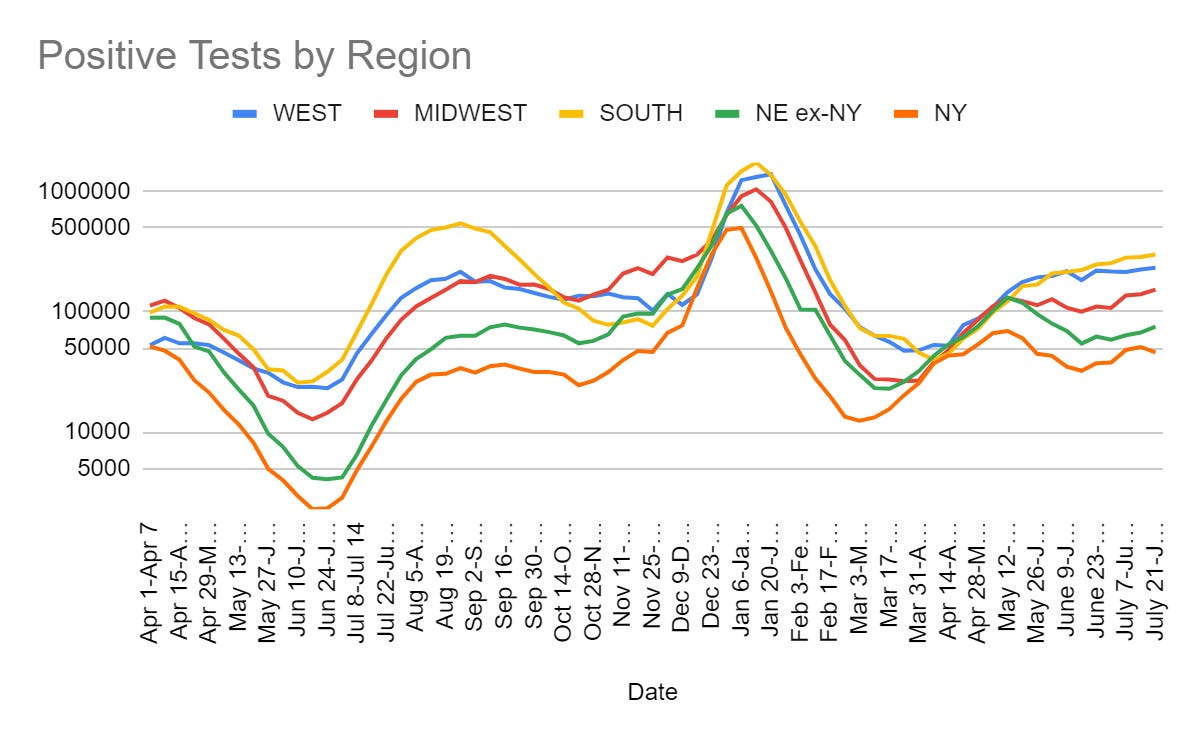

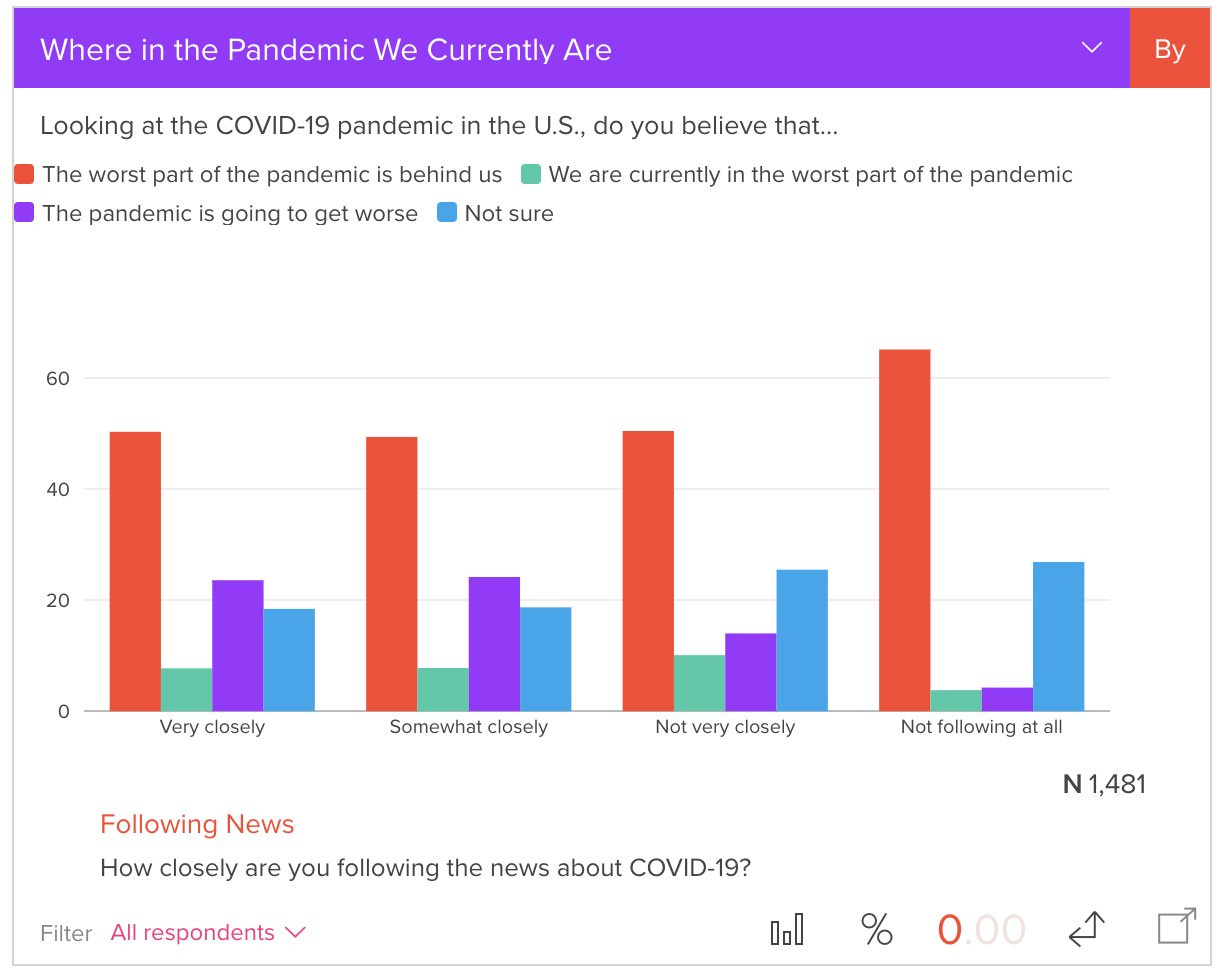
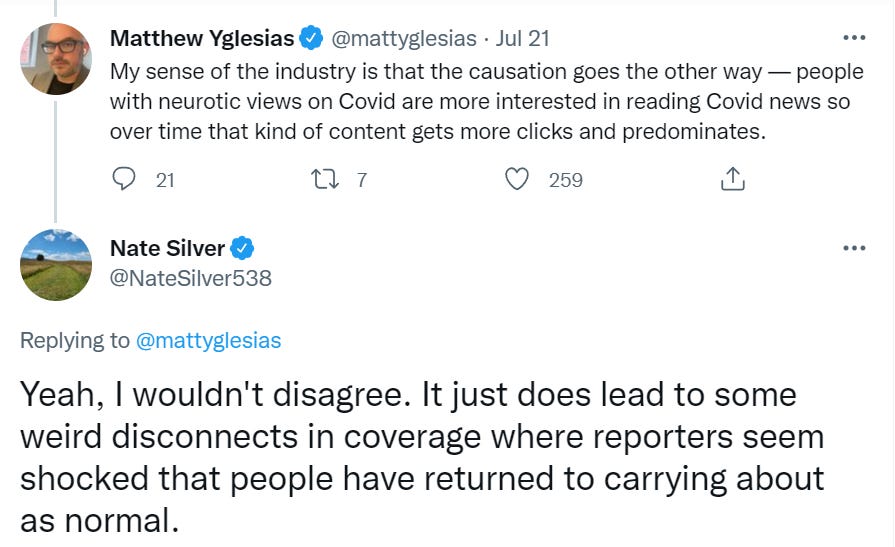
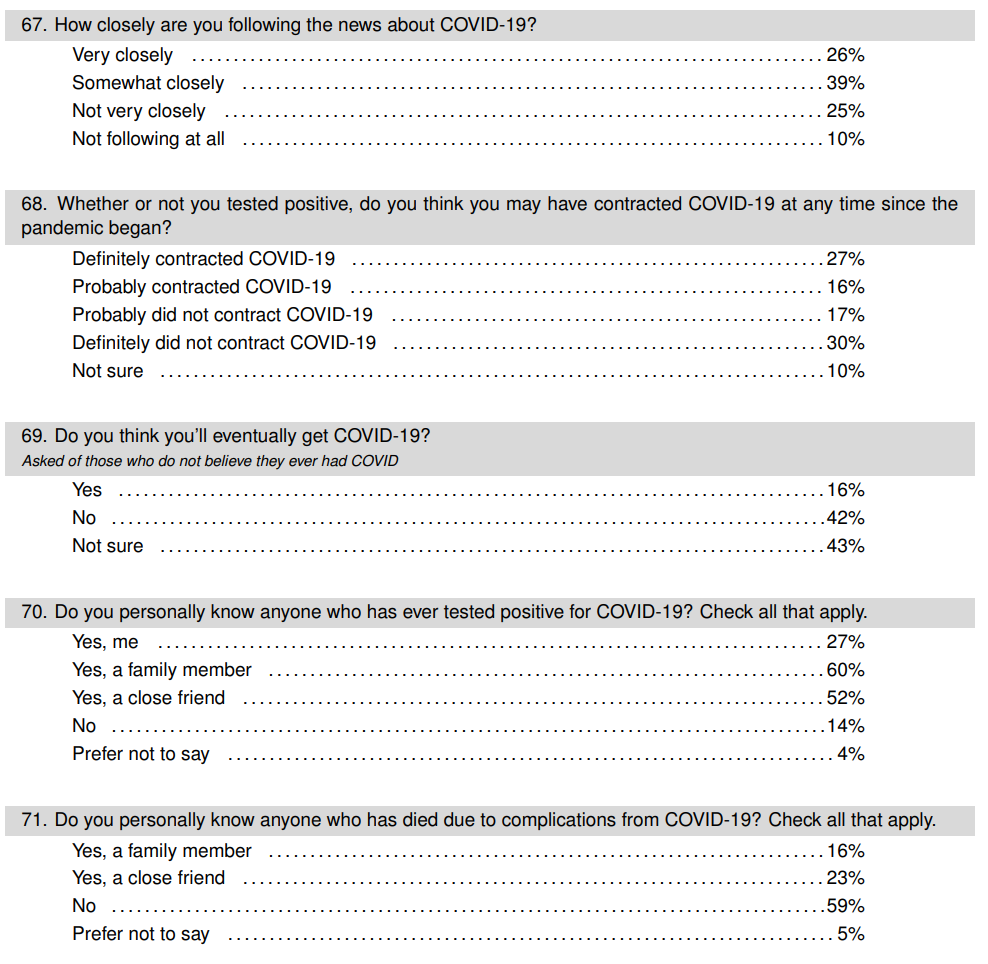
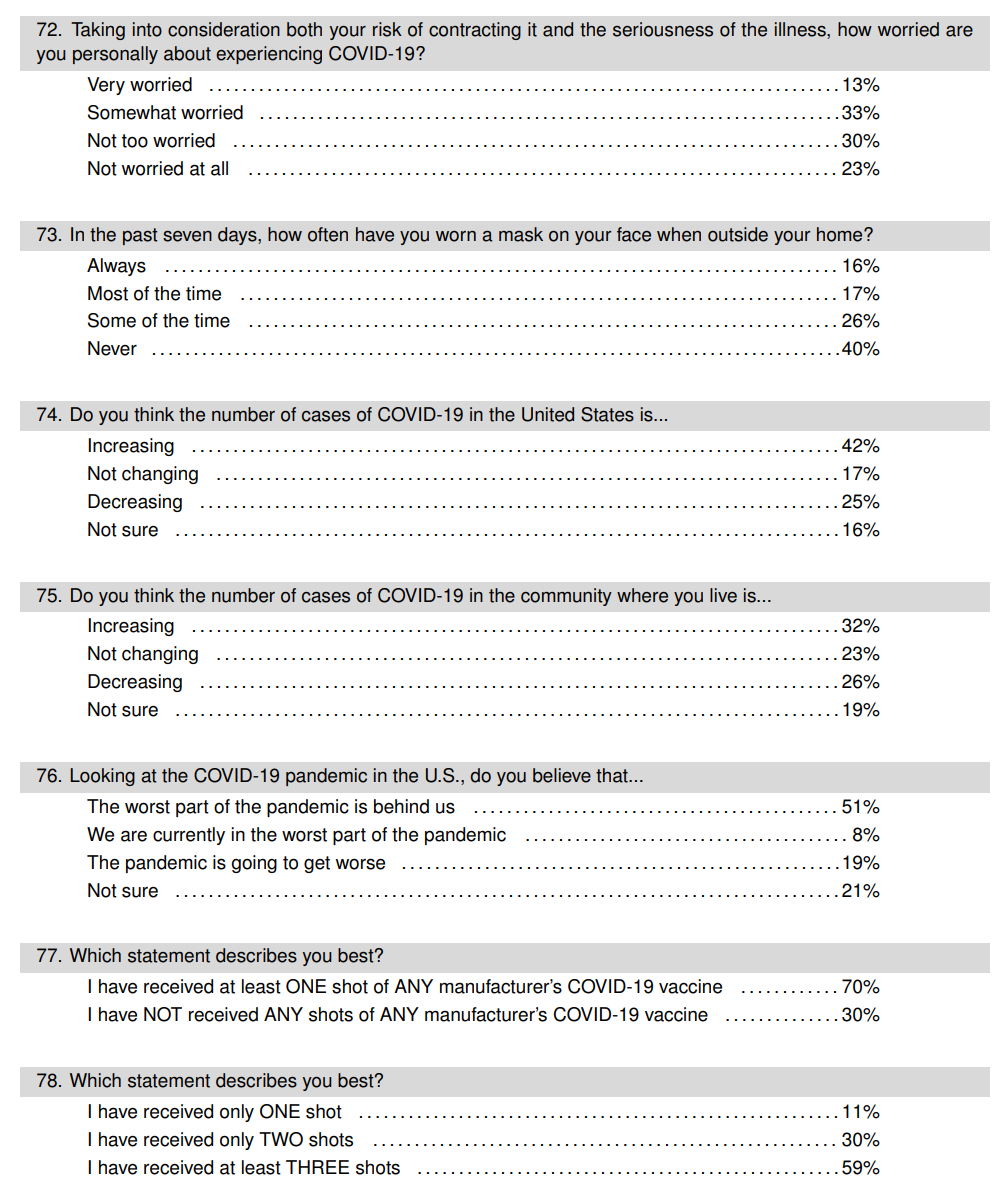

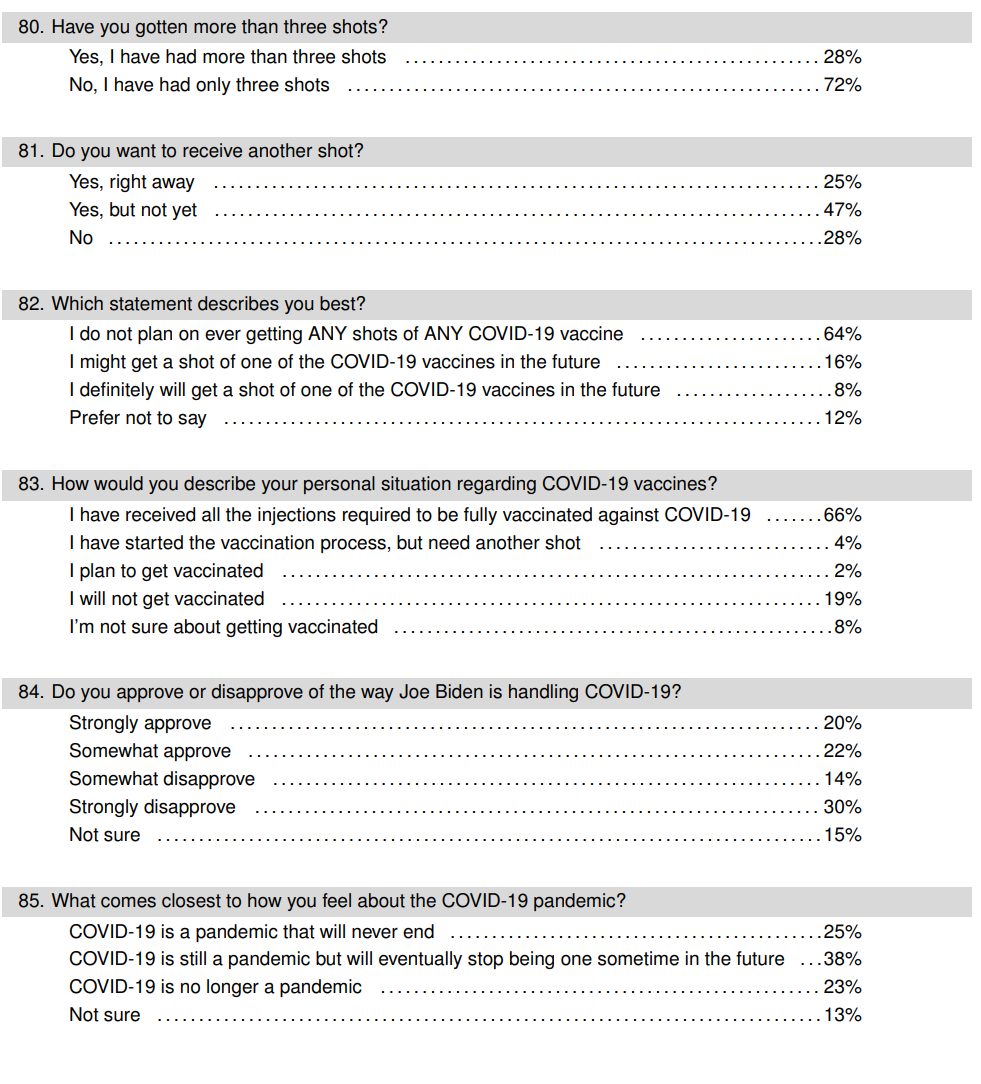

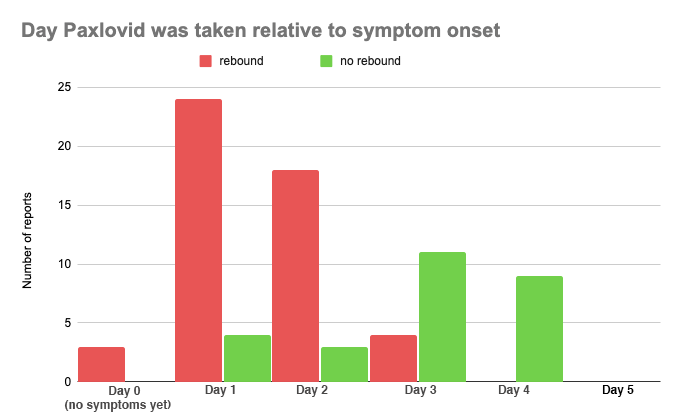
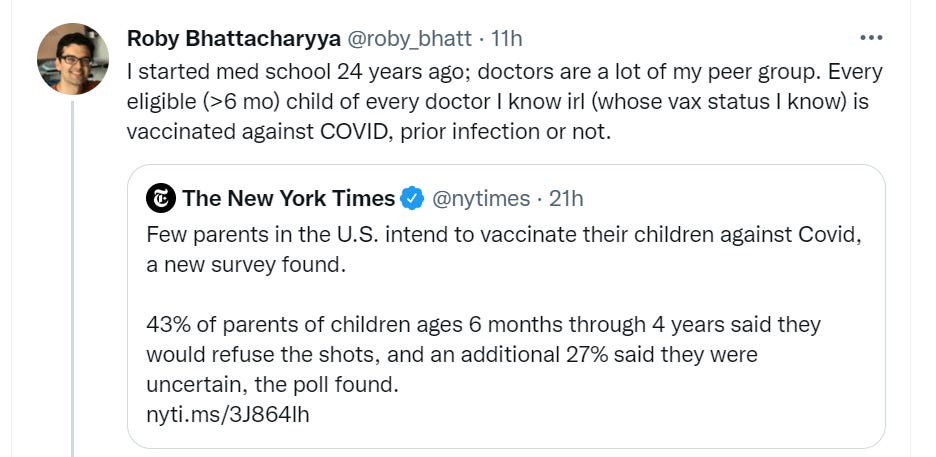

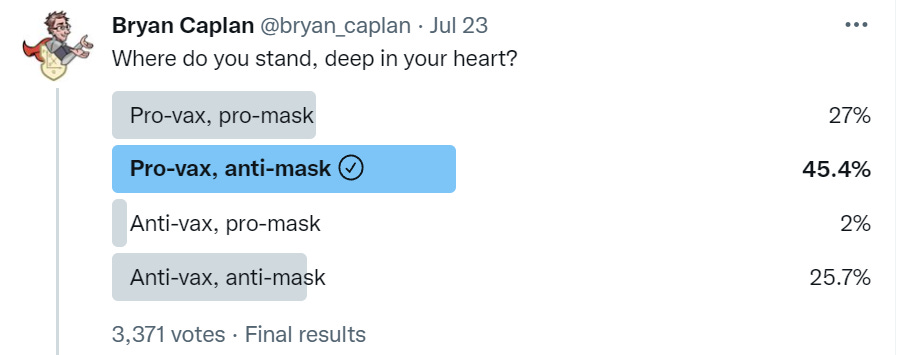


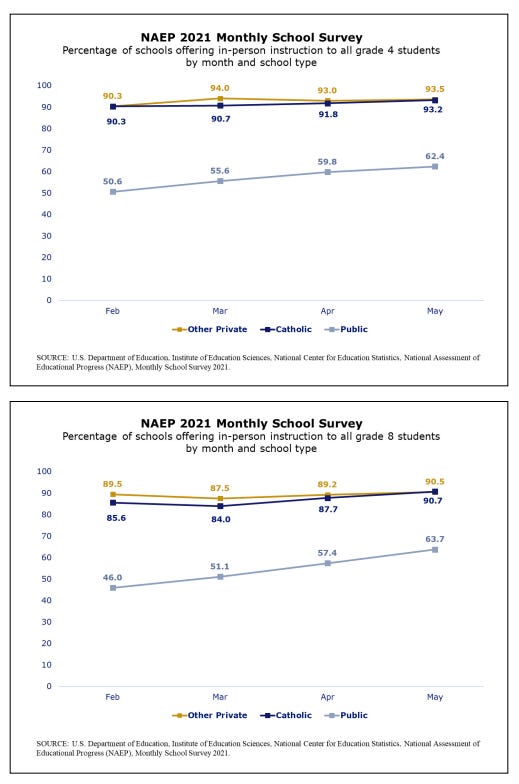
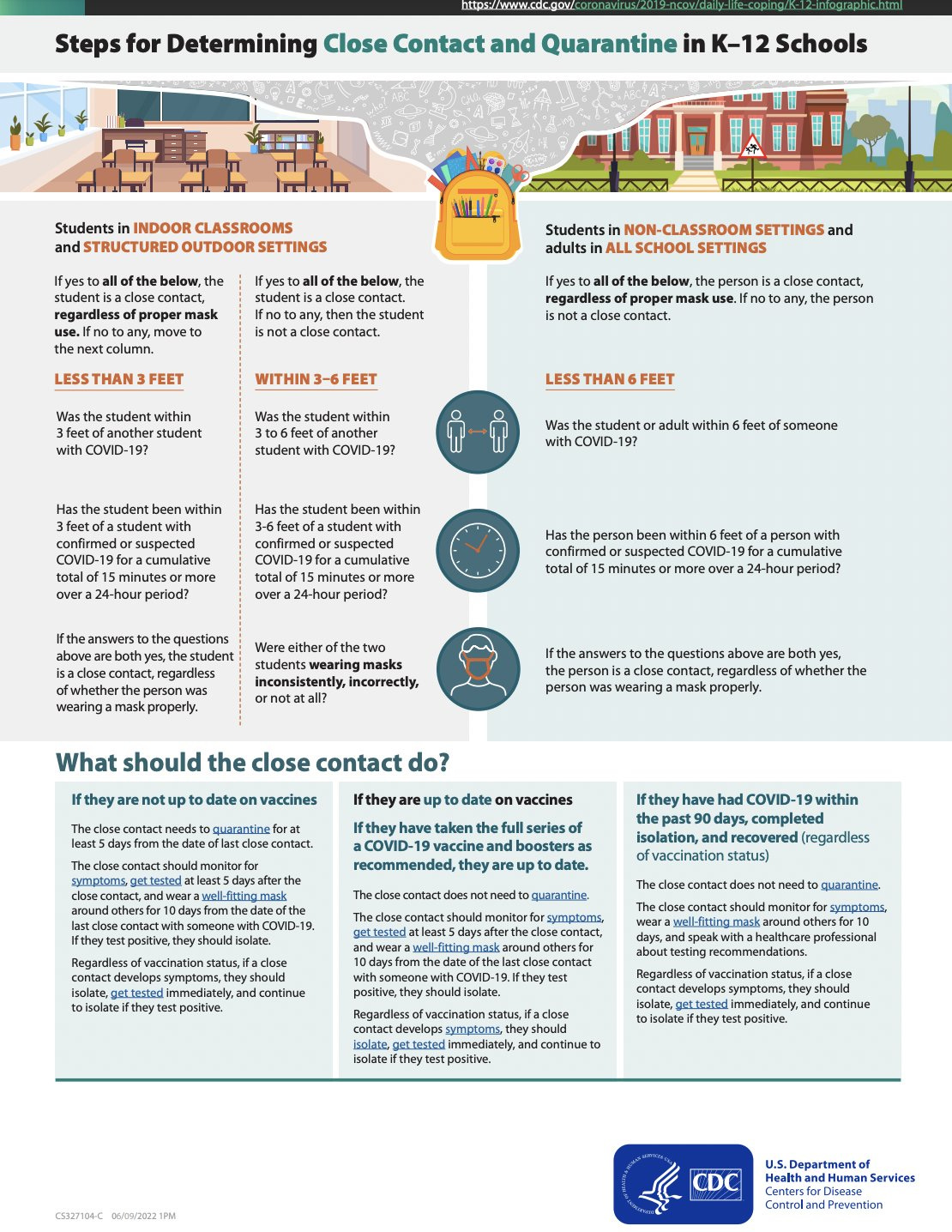
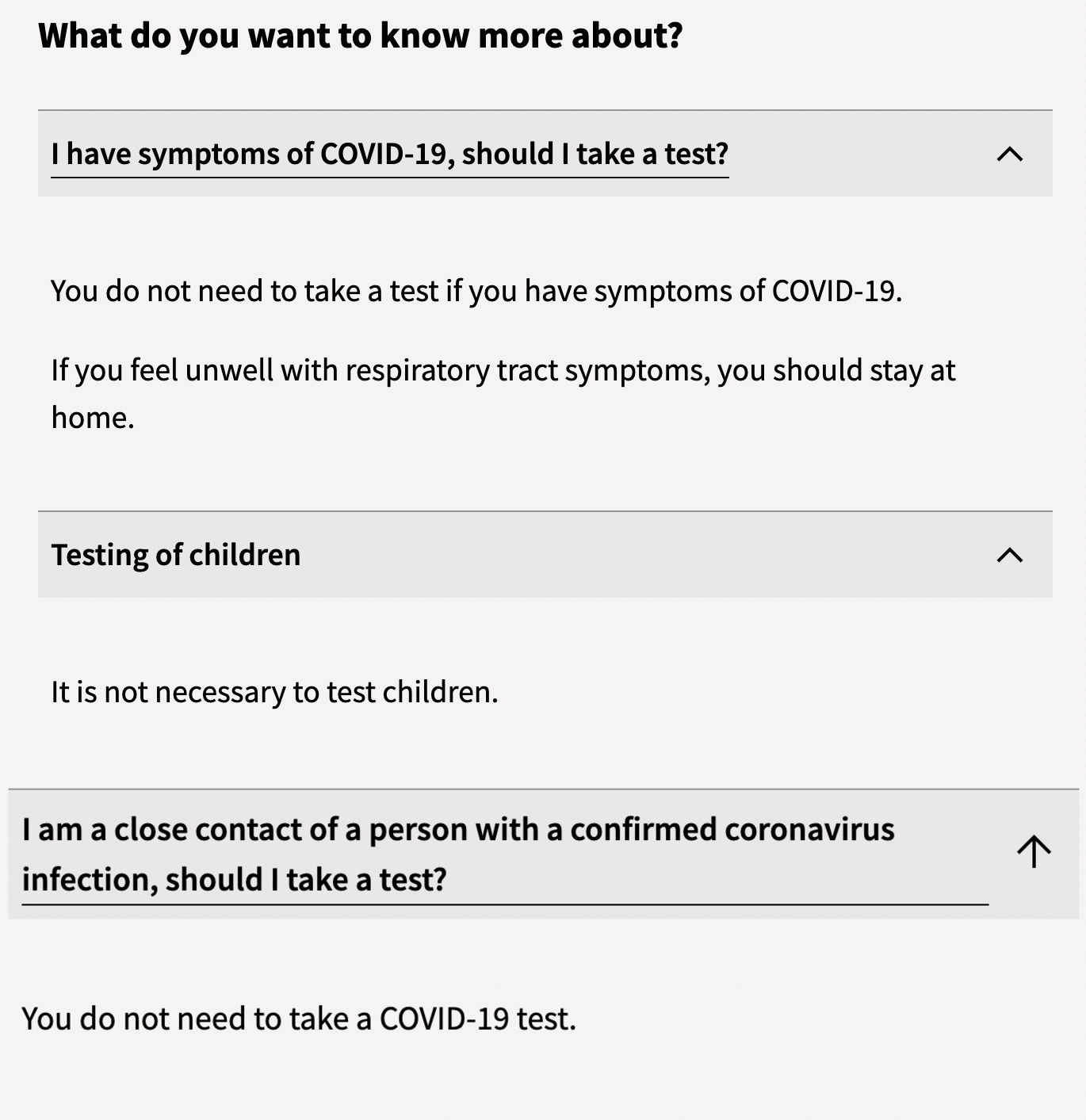
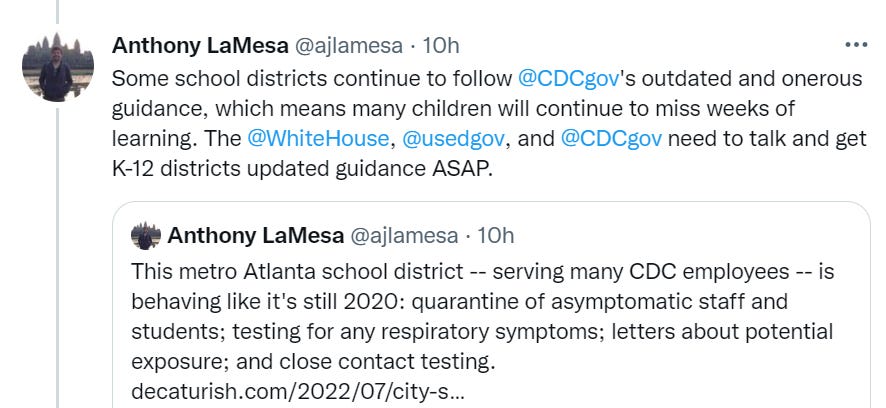

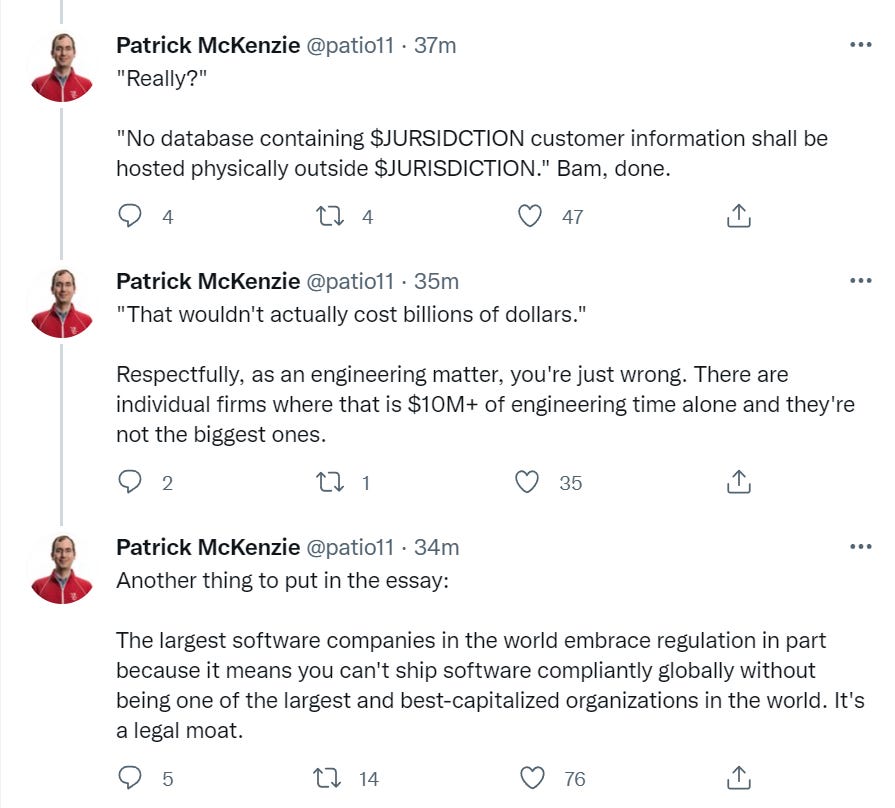
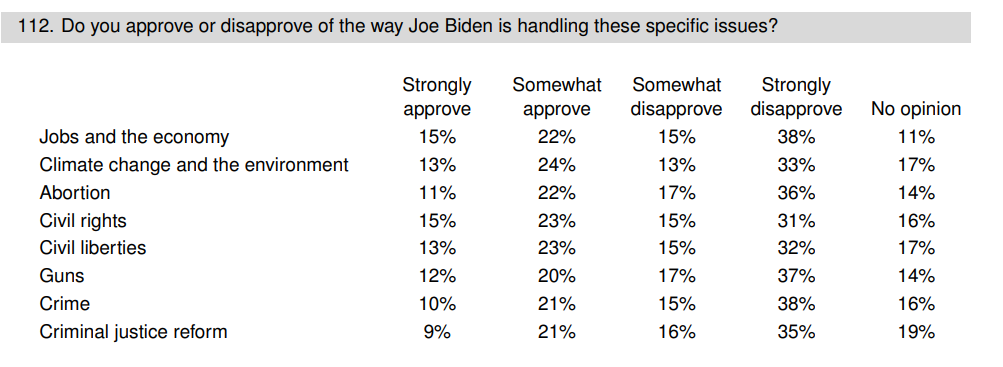

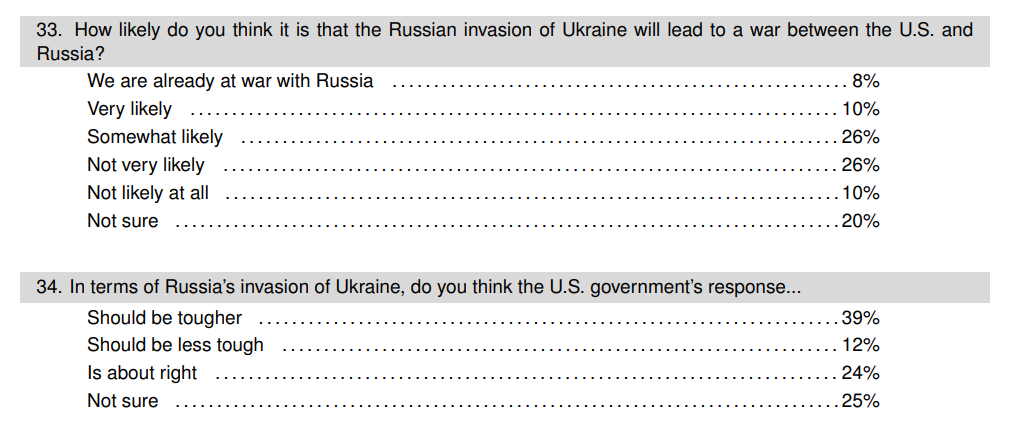

One interesting tidbit of the alzheimers story which you did not touch on here. Schrag's discovery was a direct consquence of suspicious truth-seeking short sellers investigating Simufilam. See the quote from the Science article below:
While Schrag is rightly being praised for his role in the discovery, the real heros here are the short sellers here who led the process of uncovering this fraud (and who seemingly used Schrag as an independent expert to verify their own findings/suspicions). You can find their 42 page research report submitted to the FDA in Aug 2021 (under the cover of an attorney) here: https://www.regulations.gov/document/FDA-2021-P-0930-0004
It's worth mentioning that for items like this the FDA has a public commenting process whereby interested parties can submit their thoughts on such matters for consideration. From a cursory review, the comments are unsuprisingly filled with fda lawyers and medical professionals ridiculing the fraud of the short sellers and their motivated research. Go figure. (posted a couple below for fun, don't mean to be too hard on the specific commenters, since their assumptions here may be usually correct, but I also have to imagine that some of them were themselves making use of motivated reasoning...
Last thing I'll note is that in addition to the obvious importance of this discovery, the RAT/EA community should be thrilled that this discovery is in effect maybe the most important real world discovery from 'prediction markets'. For those unfamiliar with the financial markets for early stage biotechs, they are really the closest thing to scaled prediction markets out there. For single-drug companies that are in clinical trials, investors are literally making a asymmetric probabilistic bets on the outcome of trial success, and so as one might suspect the best investors in the space tend to be teams of PhDs conducting their own analysis to derive a P (success) and then betting if their expectations are different than the market. Happy to elaborate further on specifics here when I have time if people are interested.
So who are the short sellers that deserve our praise? As noted in the article, the two short sellers are neuroscientists who submitted the complaint anonymously through an attorney.
Using regulatory databases and some google-fu, it seems rather likely that the initial short seller (or one of them) was Granite Point Capital.
If we using an SEC filing aggregator we can see that three funds had large net put short positions in Cassava in 2H 2021, when the complaint was first filed. These are LMR Partners, Perceptive (one of the very best biotech focused funds), and Granite Point.
Granite Point is smaller, with only ~$500M in AUM, is seemingly biotech focused and active in aggresive short selling (just look up their litigation). A look on linkedin at their partner group shows multiple PhDs/MDs.
Most notably, I stumbled upon this 2019 class action where Labaton, the niche law firm firm filing the cassava, is representing Granite Point, which seems to make it pretty likely that Granite were again working with Labaton in their 2021 complaint against Cassava. Its very possible that they were part of a syndicate or that there was an independent short seller pitching this to multiple funds, but the labaton tie seems to make it very likely they were involved.
https://www.labaton.com/hubfs/Joint%20Declaration%20of%20Carol%20C.%20Villegas%20and%20Adam%20M.%20Apton%20ISO%20Final%20Appro....pdf
Quote from Science Article:
"In August 2021, Matthew Schrag, a neuroscientist and physician at Vanderbilt University, got a call that would plunge him into a maelstrom of possible scientific misconduct. A colleague wanted to connect him with an attorney investigating an experimental drug for Alzheimer’s disease called Simufilam. The drug’s developer, Cassava Sciences, claimed it improved cognition, partly by repairing a protein that can block sticky brain deposits of the protein amyloid beta (Aβ), a hallmark of Alzheimer’s. The attorney’s clients—two prominent neuroscientists who are also short sellers who profit if the company’s stock falls—believed some research related to Simufilam may have been “fraudulent,” according to a petition later filed on their behalf with the U.S. Food and Drug Administration (FDA)."
Sample Comments from FDA Complaint
"This is a self serving, deceptive and destructive petition that is not filed on behalf of the human beings this drug is intended to benefit, it is filed on the behalf of one or few short sellers who have gained financially at the expense of investors and future patients.
The petition had made reference to a “whistleblower” which is typically used to refer to someone inside the company. This “whistleblower” was later revealed to be someone outside the company that held a short position in the stock. The scientific queries within this do not seek the truth, they are poorly researched and a scapegoat for this unethical practice of stock manipulation."
"FDA please act expeditiously and firmly deny this abusive and collusive CP against Cassava Sciences by Labaton Sucharow. Already the Journal of Neurosciences have confirmed Cassava’s foundational research paper and found no evidence of manipulation and only 1 human error that doesn’t impact the scientific conclusion. Also, Yale researchers have recently confirmed PTI-125’s moa and affinity binding in mice studies for hard to treat seizures. No patients have been harmed by PTI-125 and you are already aware of the breakthrough improvements AD patients are experiencing. You must not allow any further delay of your decision bc there is an obvious short and distort campaign brought on by bad actors in collusion against Cassava. I believe the SEC is in the process of looking into the matter as many investor complaints (including mine) have been brought to the office of Enforcement. Cassava’s phase 3 SPA trials must not be further impacted."
Turns out a couple of short sellers beat the Journal of Neurosciences. Shows where the real truth-seeking analysis is being done.
The Alzheimer's fraud seems very bad, but it's impact/importance in the field/research seems to have been dramatically overblown by the media, see here:
https://twitter.com/samuel_marsh/status/1550883407441416193?t=UpvL61XeS30RAq2DC6Kxvg&s=19